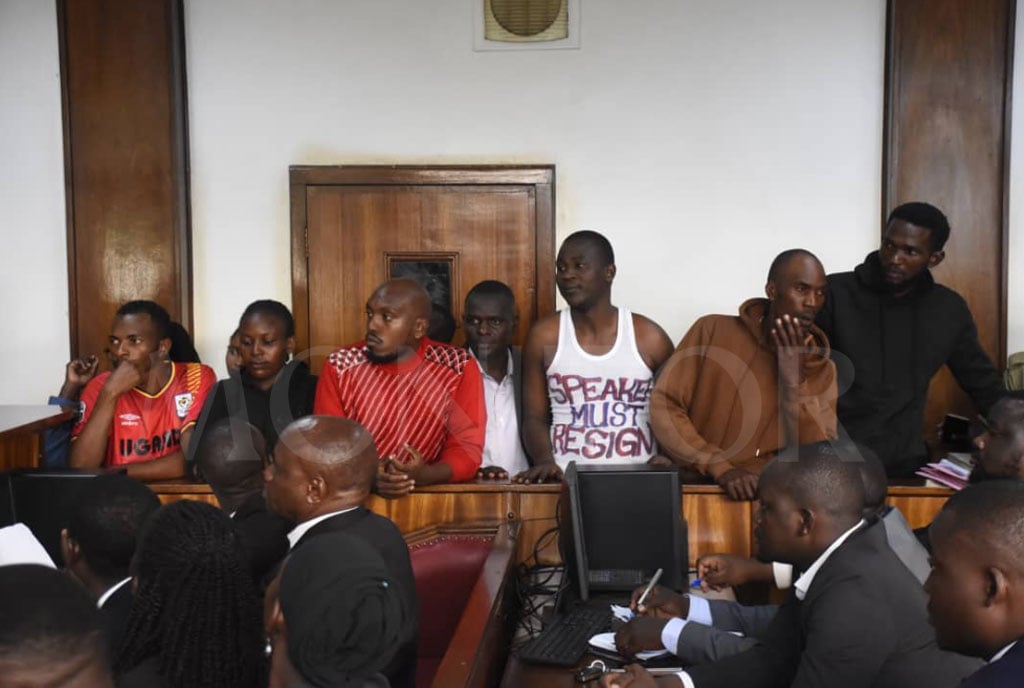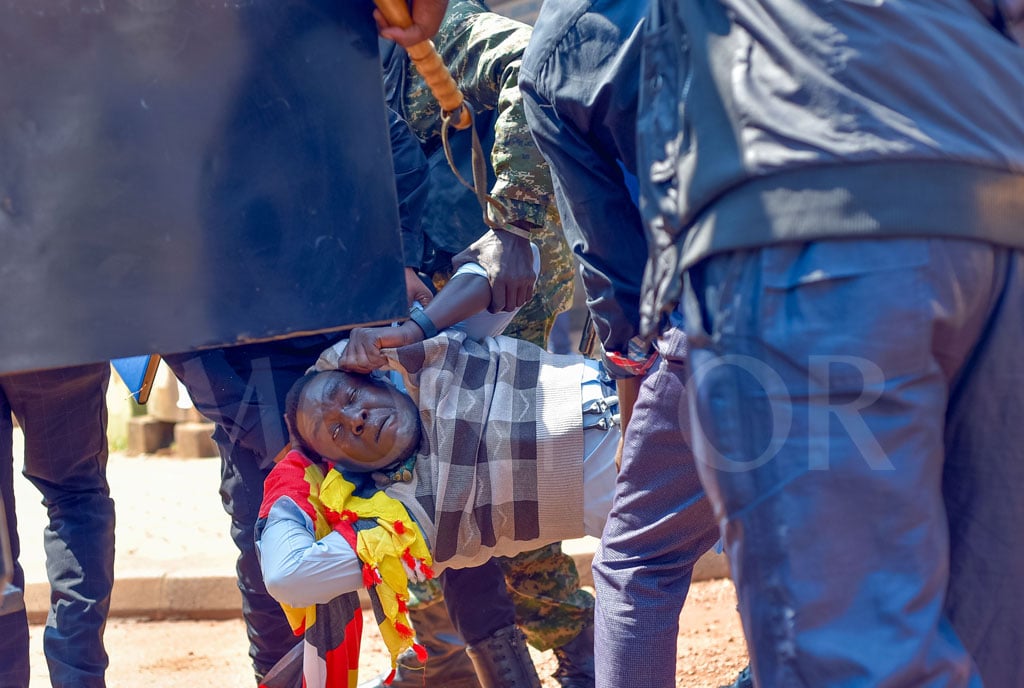
Mr George Victor Otieno (with fist up on the left) and other protesters are arrested by police on July 23 during the March to Parliament demonstrations. Mr Otieno says he was beaten up by the police after his arrest at the Central Police Station in Kampala PHOTO/ISAAC KASAMANI
On July 23 and 25, a section of youth attempted to March to Parliament to protest alleged corruption and excessive spending by Parliament. But they were quickly neutralised by the police, armed plain-clothed security personnel, and military police and more than 100 of the youth were arrested, charged in court, and sent to prison.
The majority is currently out on bail and some spoke to Daily Monitor about their experiences during the arrests and detention. Monitor’sEsther Oluka captures the journey of George Victor Otieno, 24, a Bachelor of Laws student.
I joined the protest among volunteers who coordinated the March to Parliament because I could no longer just stand by and watch our country crumble.
Our hospitals are dilapidated, schools are underfunded, roads crumbling, and unemployment is rampant, yet our leaders continue to loot and plunder our nation with impunity. Our silence emboldens them, as they now publicly glorify corruption. Our silence only fuels this cycle of injustice. It was time for us to stand up and demand better. That is why I marched.
But I was arrested alongside nine others on Siad Barre Avenue, near the Parliament Building, on July 23 at around 11am, and detained until I got bail on July 31.
Museveni to establish new bodies to fight corruption
Anxiety
I had woken up and began my day like any other but with an extra sense of anticipation. This day [Tuesday, the first day of March to Parliament] held a special significance for me. It represented the chance to make my voice heard against corruption.
The city was heavily militarised, a stark reminder of the risks involved, but it only emboldened my resolve. I then later met with other participants [for the march] for the first time, united by a shared patriotic desire for a better Uganda. This shared passion, in the face of such a heavy military presence, truly made the day unforgettable.
I informed my immediate family members of my intention to participate in the peaceful protest. Given the autocratic regime, they were understandably worried about my safety. Their concern stemmed from love and care for my wellbeing, not from a lack of support for the noble cause, which they are equally passionate about. Despite their worries, I had made up my mind. I yearned for a safe and better Uganda, for my younger siblings and aging elders and was determined to stand up for that vision.
Arrest, torture and detention
But soon, the Uganda Police Force set upon us, and the inhumane way they treated us was beyond words. I witnessed the girls arrested with me being mishandled, which was inappropriate and incredibly disheartening.
After our arrest, we were taken to Kampala Central Police Station (CPS), a place that holds only horrific memories for me. While there, I was brutally beaten and tortured by men who seemed monstrous and had no humanity.
They rained blows on me using batons and targeted my knees. One man, Matsiko, kicked my head with the force of a football, and even taunted me, saying I was lucky they had not shot me dead on the streets. All this was done to coerce me into making a statement, which I refused to do.
We were later produced before Buganda Road Court and were charged with common nuisance. After court, I was taken to the Murchison Bay wing of Luzira Prison in Kampala.
Arriving on stretcher at Luzira
I arrived at Luzira Prisons unable to walk due to the torture and excruciating pain I endured at CPS. Unlike my colleagues, I was placed on a stretcher and referred to the prison’s hospital, where I remained until our bail hearing.
I bypassed the usual prison entrance due to my injuries, but even during my time there, my hair was cut short. Despite my circumstances, both the inmates and officers who recognised the noble cause for which I was arrested, treated me with respect, and honour.
Nevertheless, my first night was agonising, filled with the pain of my injuries. I received some first aid, which provided some relief, but I still struggled to find sleep that night.

Mr George Victor Otieno (2nd left) and other protesters at the Buganda Road Court on July 23. They were charged with common nuisance. PHOTOS BY ABUBAKER LUBOWA.
Nightmares
The March to Parliament was my second protest in life but proved my first time going to prison. In my early years at university, I led a student movement that marched to raise awareness about the Sustainable Development Goal (SDG), one that calls for an end to poverty.
But words fail me to describe my experience in the March to Parliament. The threats have not stopped. Ever since my release, I have struggled to sleep, barely managing to catch a few hours of rest.
There are ongoing allegations that foreign interests are funding some of the youths who participated in protests.
The basis of these false allegations, which undermine our genuine cause, remains unclear. The issues we are speaking out against are evident to every Ugandan. It is this deplorable state, fuelled by rampant corruption and impunity that spurred us to action. Anyone who thinks we need to be ‘sponsored’ to demand a better life for ourselves is delusional.
‘We aren’t done’
But did my participation [in the March to Parliament] achieve a significant portion of our objectives? I would say, yes. The sheer boldness of our generation, marching against corruption despite intimidation and heavy deployment of security personnel, brought the issue to the forefront of national consciousness.
It [March to Parliament] sparked an unprecedented level of public discourse and debate. We were not silenced and our voices were heard. The march was just the beginning. We are determined to build a better Uganda, and this movement represents a powerful step in that direction.
‘We’ll stand, speak out’
To those who marched with us on July 23, to those who stood in solidarity from afar, thank you. Your courage and commitment are a testament to the power of the people.
To the youth of Uganda, this is our moment. We have a responsibility to take charge and build a better future for ourselves and for generations to come. Those who are plunging our country into darkness will not be part of the future we are destined to live. Our bold step was a reminder of the power of youth. Let us not allow this moment to fade. Let us continue to stand up, speak out, and demand a better Uganda. The future is ours to build.
Police reaction
On the allegations of torture of protesters at Kampala Central Police Station, police spokesperson Kituuma Rusoke in a WhatsApp message to Daily Monitor on July 18 said: “Beating a suspect is illegal. Cases of beatings should be raised as complaints to the Police Professional Standards Unit.
He added: “Any arrest by police in respect [to allegations of torture], we would wish to know specific names of persons so that we establish the specific offence preferred against that person. If any person gets arrested and no charge is preferred, they should complain formally to our Police Professional Standards Unit.”




